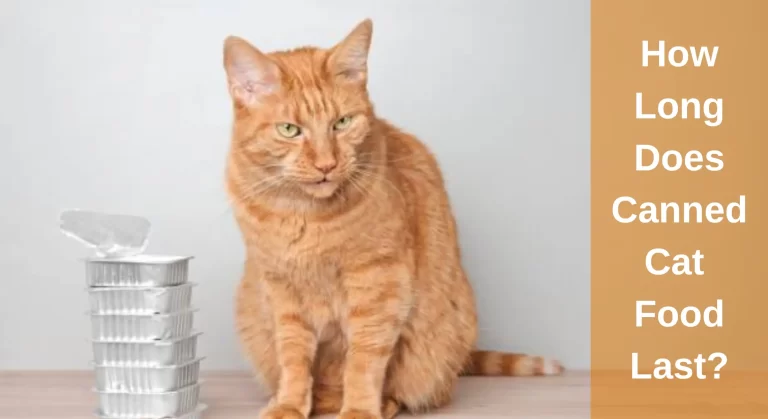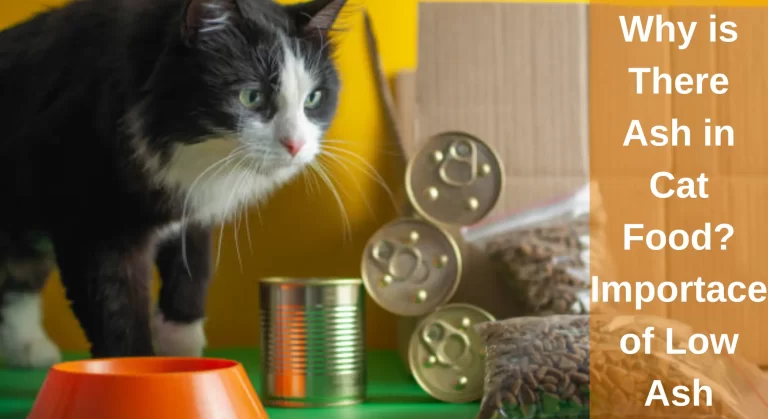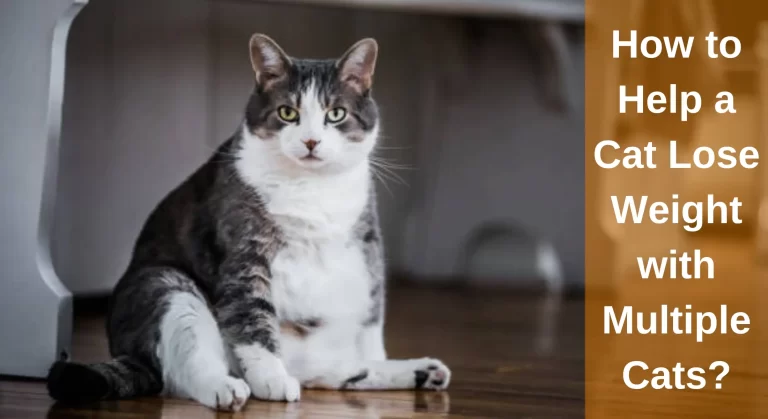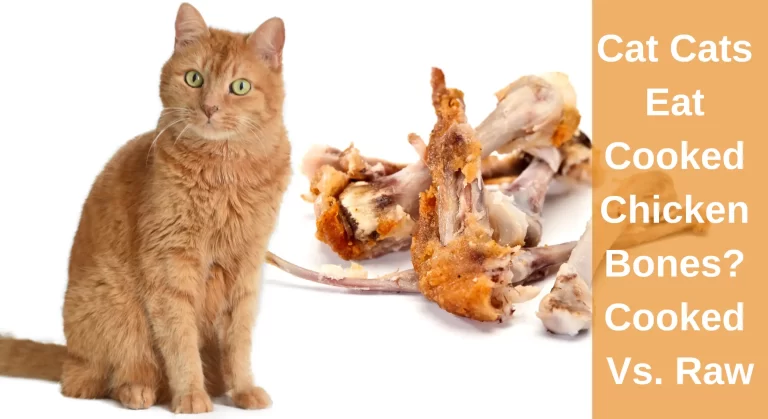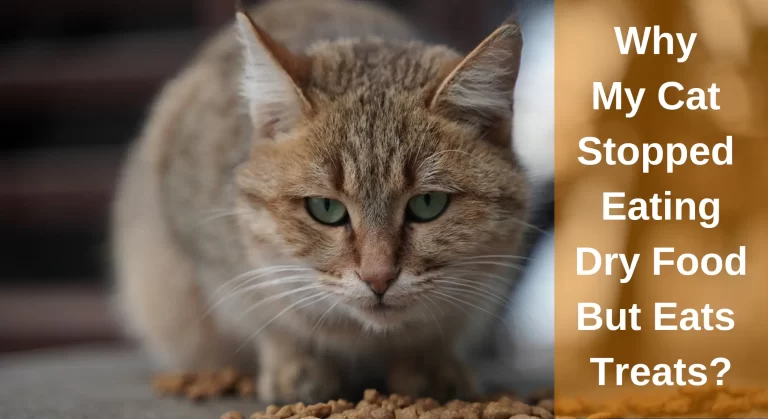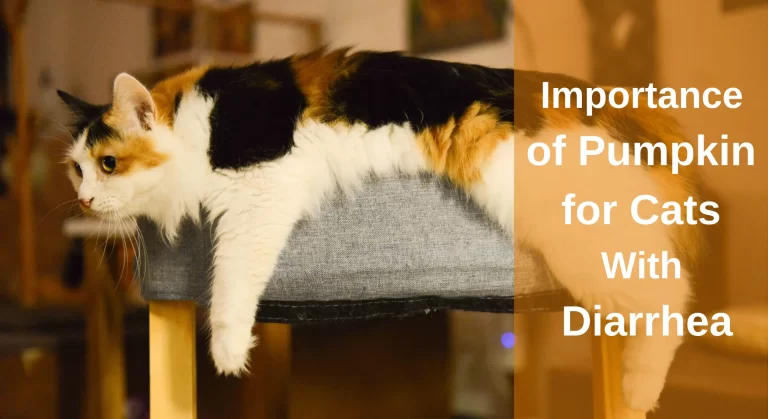Can Cats Drink Ice Water? How Safe Is It To Put Ice In Cats’ Water?
On a hot day, you pour yourself a cold glass of water with ice cubes. You start thinking about your furry friend and how they might also be feeling the heat. You decide to add some ice cubes to their water bowl, hoping it will encourage them to drink and stay hydrated in the hot weather. After all, cats have a reputation for being finicky and sensitive creatures.
So Can Cats Drink Ice Water? Yes, cats can drink ice water. While cats are generally more inclined to drink cool or room-temperature water, some cats enjoy having ice in their drinking water, particularly in hot summer weather. It’s important to note that the water should not be too cold to avoid stomach discomfort. It can serve as an incentive for increased water consumption while also providing entertainment. However, it’s important to ensure that your cats don’t consume the ice itself and only use it as an occasional treat. Regular monitoring will help prevent any potential issues.
In this article, we will explore the topic of cats and ice water, shedding light on its potential effects, risks, and alternatives.
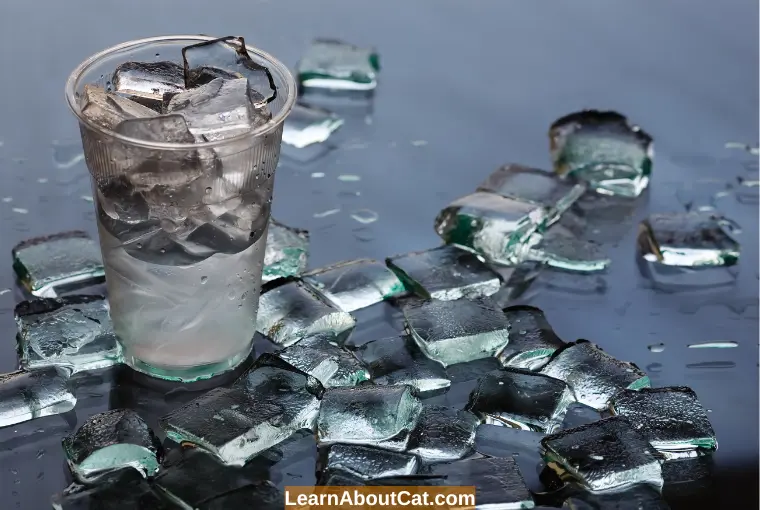
Why Does My Cat Like Ice Water?
It’s not uncommon for cats to show an affinity for ice water, despite their general sensitivity to temperature variations. While each cat has its own preferences, there are a few reasons why your feline friend might enjoy drinking ice water. Let’s explore some possible explanations:
- Temperature Sensitivity: Cats have a higher body temperature than humans, ranging from 100.5°F to 102.5°F (38°C to 39.2°C). Therefore, they may find colder water more refreshing, especially during hot weather. The sensation of coolness on their tongue can be appealing and provide relief from the heat.
- Novelty and Playfulness: Cats are curious creatures, and the presence of ice cubes floating in their water bowl can pique their interest. They might enjoy batting the ice cubes around, playing with them, or simply find the movement intriguing. The interaction with the ice cubes adds a level of entertainment to their drinking experience.
- Texture and Enrichment: Some cats are attracted to the texture of ice. Chewing on ice cubes can provide a different sensation in their mouth, which some cats find enjoyable. The hardness and crunchiness of ice can provide a satisfying sensory experience for them.
- Environmental Enrichment: Offering ice water to your cat can be a form of environmental enrichment. Environmental enrichment refers to providing stimuli and activities that engage and stimulate a cat’s senses. The presence of ice cubes in their water bowl can provide sensory variety, keeping them mentally stimulated and entertained.
While it’s important to note that not all cats may enjoy ice water, those that do often find it an interesting and refreshing addition to their drinking routine. However, it’s crucial to consider your cat’s comfort and be mindful of any potential risks associated with very cold water. Always monitor your cat’s behavior and make adjustments accordingly to ensure their well-being.
Interesting Read: Can Cats Drink Distilled Water?
Can Cats Have Ice Cubes? Is It Safe to Put Ice in Cat’s Water?
Yes, Adding ice to your cat’s water is generally safe, and surprisingly, some cats find pleasure in doing so! , but it’s crucial to supervise them closely. Ice cubes can play a vital role in maintaining your cat’s hydration, particularly during sweltering weather.
Furthermore, they can provide relief to a cat’s throat or gums that may be experiencing discomfort.
Nevertheless, it is crucial to ensure that the ice cubes are of an appropriate size to avoid any potential choking risks.
Additionally, maintaining a clean and fresh water bowl is essential to prevent the proliferation of harmful bacteria.
Check Out: Can Cats Drink Bottled Water?
Is Cold Water Bad for Cats?
No, cold water is not bad for cats. Just as humans enjoy refreshing, chilled drinks, cats also find cooler water appealing. Cold water can help to keep your cat hydrated, especially during hot weather. It can also help to freshen up their water bowl and make it more appealing to drink from.
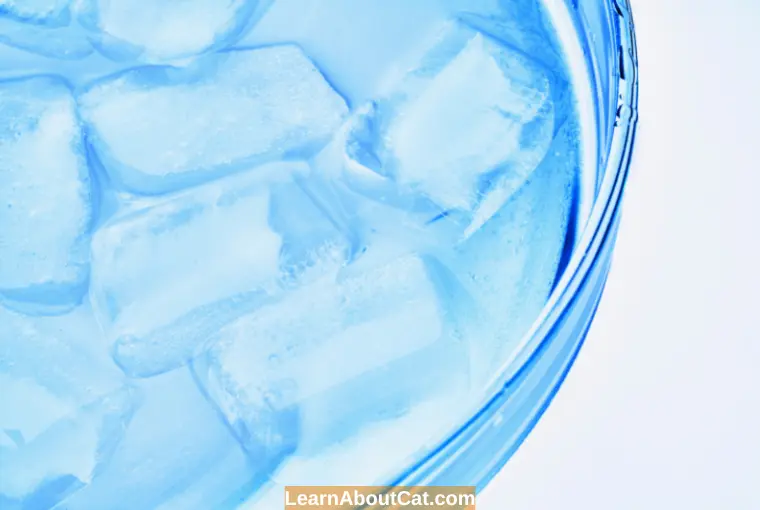
However, it’s important to consider the room temperature. If the environment is already cold, your cat may not be motivated to drink water at all.
There are a few things to keep in mind when giving your cat cold water. First, make sure that the water is not too cold, as this could cause stomach upset. Second, if you are giving your cat ice cubes, make sure that they are small enough so that they do not pose a choking hazard.
Another aspect to keep in mind is that excessively cold water can cause a brain freeze sensation in cats, similar to the discomfort humans experience from consuming too much ice cream. This can discourage them from drinking water.
Risks of Putting Ice in Cat’s Water
While generally considered safe for cats, there are potential risks associated with giving them water with ice cubes. Some cats may attempt to bite and consume the ice, which can be detrimental to their well-being.
Potential Tooth Damage
As previously mentioned, certain cats may attempt to bite and consume ice cubes with their small mouths. This behavior can lead to significant dental problems, including the risk of broken or chipped teeth. Such dental issues can ultimately result in digestion problems, choking hazards, and mouth pain.
While the majority of cats are more inclined to lick ice rather than bite it, it is important to closely monitor inquisitive and adventurous pets, especially when ice is present in their water.
Possibility Of Brain Freez
Similar to humans, cats can experience an uncomfortable sensation known as brain freeze when they consume frozen treats. Whether it’s from excessive licking or biting something frozen, cats of all breeds tend to exhibit a comical reaction with open jaws and wide eyes when they consume frozen treats too quickly.
Although brain freeze is not inherently harmful to their health, it can cause discomfort and potentially result in mild pain.
Potential Digestive System Effects
Introducing ice into your cat’s drinking water significantly reduces its temperature. Consuming large amounts of icy cold water at once can lead to stomach discomfort and potentially result in a slowed-down metabolism, especially if this practice becomes regular.
Potential for Mess
When ice cubes are added to your cat’s drinking water, it is likely that your cat will playfully interact with the floating cubes using their mouth or paws. This can lead to a considerable mess, particularly if you have an indoor cat. Dealing with the resulting puddles can become quite bothersome.
Also, Check Out: Can Cats Drink Spring Water? (Spring Water vs. Tap Water)
Benefits of Putting Ice in Cat’s Water
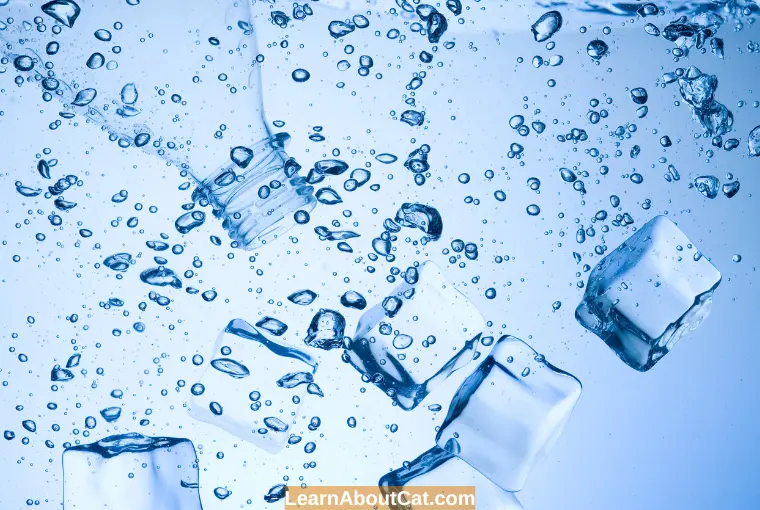
Promotes Increased Water Consumption
Cats can be quite selective when it comes to their water preferences. Some may avoid drinking from a water bowl placed near their food, while others show a preference for drinking from cat fountains. In some cases, it is possible that cats will refuse to drink altogether if the water temperature does not meet their liking
Most cats find cool water appealing, and some even enjoy it when it’s icy cold. It’s easy to encourage your cat to drink more water by adding ice cubes to his water bowl. Additionally, using water fountains can also help stimulate their drinking behavior.
Natural Cooling Effect
Although cats are adept at regulating their body temperature, providing them with a little assistance from their human companions can greatly contribute to their comfort. Offering your cat iced water can help them naturally cool down and feel more comfortable, especially during warmer weather.
Additionally, it is important to regularly change your cat’s water to ensure its freshness and cleanliness. If you would like to learn more about how often you should change your cat’s water and why it is necessary, we have an informative article available on our website.
Provides Entertainment
In addition to making drinking water more enticing, adding ice cubes can also provide a source of entertainment for your cats.
It can be fun for them to bat, bobble, and lick the floating cubes of ice in their water, which can provide a brief period of entertainment for them.
You Also Like to Read About: Can Cats Drink Lemon Water?
Alternatives To Giving Your Cat Iced Water
If you cannot monitor your cat when you give it ice water, there are some safer options to keep your feline’s water refreshing all day long:
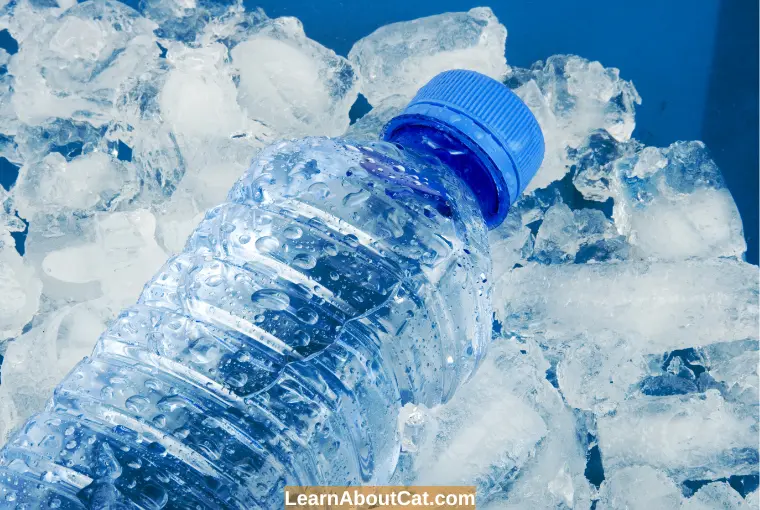
Fresh Filtered Water
If you’re concerned about offering your cat ice water, there are alternatives that can help keep them hydrated. Consider providing fresh, filtered water at room temperature. You can also try offering low-sodium chicken or fish broth as a treat. These options can be appealing to cats and encourage them to drink more.
Frozen Catsicles
Frozen treats are made specifically for cats to help them beat the heat and provide a refreshing experience.
Creating catsicles is simple: prepare a cat-friendly mixture, freeze it in ice cube trays, and serve it to your furry friends. Catsicles offer a cooling sensation and hydration, as cats enjoy licking and nibbling them.
Remember to give catsicles in moderation, using safe ingredients. Treat your feline companions to homemade catsicles for a delightful and comforting experience on warm days.
Creative Methods to Entice Cats to Drink Water
Some cats may be more inclined to drink water if it’s presented in a more engaging way. Experiment with different water bowl designs, such as shallow or wide bowls, or even use a cat-friendly water fountain.
You can also get ice packs commercially designed for pets, or you can add the ice cubes in a ziplock bag and place it at the base of your furry friend’s water bowl.
Worth to Read: Can Cats Drink Cold or Warm Milk?
What is the Ideal Temperature of Water to Give My Cat?
The ideal temperature for water to give to your cat is typically room temperature, around 68-78 degrees Fahrenheit or 20-25 degrees Celsius. This temperature range is comfortable for most cats and encourages them to stay hydrated. Providing water within this range ensures that it is neither too hot nor too cold, allowing your cat to drink it easily and comfortably.
Water that is too hot or too cold can have adverse effects on your pet’s health. A convenient way to achieve this is by adding cold water from the faucet to your cat’s water bowl twice a day. It is also advisable to change your cat’s water throughout the day to maintain its freshness.
Frequently Asked Questions
Can cats lick ice cubes?
Yes, cats can lick ice cubes. Many cats find the texture and coolness of ice cubes intriguing and may enjoy licking them. However, it’s essential to ensure that the ice cubes are small enough to prevent any choking hazards. Additionally, monitoring your cat while they interact with ice cubes is important to ensure their safety.
Can cats eat ice cream?
No, cats should not eat ice cream. Ice cream contains ingredients like sugar, dairy, and potentially harmful additives that can be detrimental to a cat’s health. Cats lack the necessary enzymes to properly digest lactose found in dairy products, which can lead to digestive issues such as diarrhea. It’s best to avoid feeding ice cream to cats and opt for cat-friendly treats instead.
How can I make my cat drink more water?
Offering multiple water sources, using a pet fountain, and providing low-sodium broth can encourage your cat to drink more water. Additionally, keeping the water fresh and clean, as well as ensuring it is at an optimal temperature, can also entice your cat to drink.
Can cats drink water directly from the tap?
Cats can drink water directly from the tap if the water is clean and safe for human consumption. However, some cats may be sensitive to the taste or odor of tap water, so providing filtered or bottled water can be a good alternative.
How often should I change my cat’s water?
It’s recommended to change your cat’s water at least once a day. However, if you notice any debris or contaminants in the water, it should be changed immediately. Regularly cleaning and refilling the water bowl ensures your cat has access to clean and fresh water at all times.
Is it safe to add flavoring to my cat’s water?
It is not recommended to add flavoring to your cat’s water. Flavorings can be harmful to cats, and they can also make it difficult for your cat to get the water they need. Here are some of the risks of adding flavoring to your cat’s water:
Flavorings can be harmful to cats. Some flavorings can cause stomach upset, diarrhea, and vomiting. Others can be toxic to cats.
Flavorings can make it difficult for your cat to get the water they need. If your cat is used to drinking flavored water, they may not be interested in drinking plain water. This can lead to dehydration, which can be serious
Conclusion
while cats can technically drink cold water, it’s important to consider their individual sensitivities and potential risks. Extreme coldness may cause digestive discomfort, dental issues, or temperature shock in cats. It’s best to offer fresh water at a moderate temperature to ensure their well While some cats may enjoy the addition of ice cubes, it is important to monitor them closely to prevent any potential risks or adverse effects. Just make sure the ice is shredded or broken into small bits.
If you are worried they might bite into the ice and damage their little teeth, there are plenty of ways to keep your feline’s water fresh. You can buy a pet water cooler, place a frozen water bottle in their bowl or add ice cubes into a zip lock and place it into the bowl.
Who is Isabella?
My name is Isabella, and I am a dedicated and knowledgeable cat enthusiast. With years of experience caring for cats and a deep love for felines, I made a mission to help other cat lovers navigate the challenges of cat ownership.

